Related Research Articles
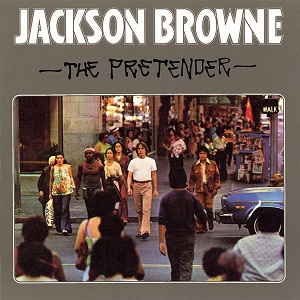
The Pretender is the fourth album by the American singer-songwriter Jackson Browne, released in 1976. It peaked at No. 5 on Billboard's album chart. The singles from the album were "Here Come Those Tears Again", which reached No. 23, and "The Pretender", which peaked at No. 58.
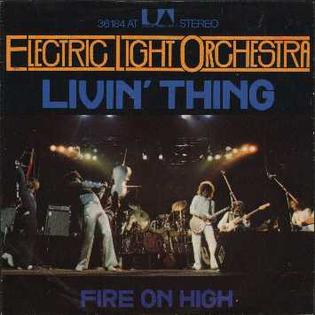
"Livin' Thing" is a song written by Jeff Lynne and performed by Electric Light Orchestra (ELO). It appears on ELO's 1976 album A New World Record and was also released as a single. Patti Quatro sang uncredited vocals, particularly the "higher and higher" parts.

I'm Alive is the tenth album by American singer-songwriter Jackson Browne, released in 1993. The title track, "I'm Alive", reached No. 18 on the Album Rock Tracks chart and No. 28 on the Adult Contemporary chart. Other singles released from the album were "Everywhere I Go" and "Sky Blue and Black".
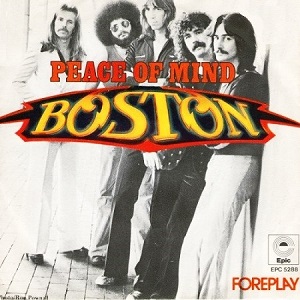
"Peace of Mind" is a song by American rock band Boston, written by Tom Scholz. It was on their 1976 self-titled debut, and was released the next year as the third and final single from the album. It peaked at number 38 on the U.S. Billboard Hot 100 in 1977, as well as number 33 on the Cash Box Top 100. It received substantial radio airplay, both upon the initial release of the Boston album and subsequently, and has been described as a "rock-radio staple".
"Smokin'" is a song by American rock band Boston, released from the band's debut album Boston (1976) as the B-side to the band's first single, "More Than a Feeling". "Smokin'" was written by the band leader, guitarist and main songwriter Tom Scholz and lead vocalist Brad Delp.

"Feelin' Satisfied" is a song by American rock band Boston, released on their 1978 studio album Don't Look Back. The song was written by Tom Scholz and released as a single in 1979. The single peaked at #46 on the US Billboard Hot 100. It reached #84 in Canada. It was the band's last release for 7 years, until Third Stage in 1986.

"Telephone Line" is a song by English rock band Electric Light Orchestra (ELO). It was released in May 1977 through Jet Records and United Artists Records as part of the album A New World Record. It was commercially successful, topping the charts of Canada and New Zealand and entering the top 10 in Australia, the United Kingdom, and the United States.

"Running on Empty" is a song by American singer-songwriter Jackson Browne. It is the title track of his 1977 live album of the same name, recorded at a concert at Merriweather Post Pavilion in Columbia, Maryland, on August 27, 1977. A number 11 hit on the US Billboard Hot 100 when it was released as a single, it spent seventeen weeks on the chart after debuting on February 11, 1978 at position 72. Rolling Stone ranked it at number 496 on its list of "The 500 Greatest Songs of All Time" in 2010 and number 492 in 2004 and it is one of Browne's signature songs. "Running on Empty" was most popular in Canada, where it spent two weeks at number four.
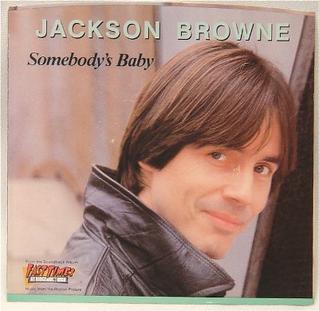
"Somebody's Baby" is a song written by Jackson Browne and Danny Kortchmar and recorded by Browne for the 1982 Fast Times at Ridgemont High movie soundtrack. Reaching No. 7 on the US Billboard Hot 100 after debuting at No. 73 on July 31, 1982, the track would be Browne's last top ten hit, as well as the highest-charting single of his career, spending a total of nineteen weeks on the chart.
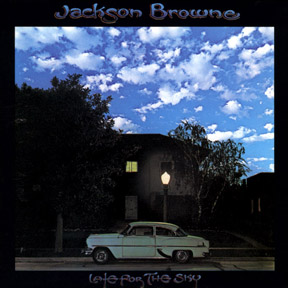
Late for the Sky is the third studio album by American singer–songwriter Jackson Browne, released by Asylum Records on September 13, 1974. It peaked at number 14 on Billboard's Pop Albums chart.

"Doctor, My Eyes" is a 1972 song written and performed by Jackson Browne and included on his debut album Jackson Browne. Featuring a combination of an upbeat piano riff coupled with lyrics about feeling world-weary, the song was a surprise hit, reaching number 8 on the Billboard Hot 100 in spring 1972, after debuting on the chart at number 80. Browne would not see the chart's Top 10 again until 1982's soundtrack hit "Somebody's Baby", although "Running on Empty" just missed the Top 10, reaching number 11. Billboard ranked "Doctor My Eyes" as the No. 92 song for 1972. In Canada, the song peaked at number four.

"The Load-Out" is a song co-written and performed live by Jackson Browne from his 1977 album Running on Empty. It is a tribute to his roadies and fans. The song was recorded live at Merriweather Post Pavilion in Columbia, Maryland, on August 27, 1977, as part of the tour in support of the album The Pretender.

"The Pretender" is a song written and performed by American rock performer Jackson Browne and featured on his 1976 album The Pretender.

"Hold On Hold Out" is a song written by Jackson Browne and Craig Doerge and performed by American singer-songwriter Jackson Browne. It is from his 1980 album Hold Out. It was released as the third single from the album, but due to its slightly over-eight-minute length, it was released as a "specially priced" 12-inch 45 rpm record instead of the traditional 7-inch 45, Asylum records possibly hoping to repeat the 12-inch airplay success of "The Load-Out/Stay" medley from the previous album. However, "Hold On Hold Out" only reached number 103 on the Billboard Bubbling Under Hot 100 chart.

"You Love the Thunder" is a song written and performed by American singer-songwriter Jackson Browne from his 1977 live album, Running on Empty, recorded at a concert at Garden State Arts Center in Holmdel, New Jersey, on September 6, 1977. Released as the third single a full year after the album came out, it only reached #109 on Billboards Bubbling Under Hot 100 Singles chart, though it received increased Album-Oriented Rock airplay. The B-side of the U.S. single was "The Road"; however, the B-side for the British single was "Cocaine".

"Here Come Those Tears Again" is a song co-written and performed by American singer-songwriter Jackson Browne and included on his 1976 album The Pretender. Released as a single, it reached #23 one year to the week after the death of Browne's wife, Phyllis Major, spending nine weeks on the chart, after entering the Billboard Hot 100 on February 5, 1977, at position #64, the highest debut of the week. It also reached #15 on the Billboard Adult Contemporary chart. The single was the eighth-highest charting of his Hot 100 career. It was also released as a single in the United Kingdom, Germany and Japan.
"Jamaica Say You Will" is a song written and performed by American singer-songwriter Jackson Browne. It is the first song on his 1972 self-titled debut album.

"Walking Slow" is a song written and performed by American singer-songwriter Jackson Browne, released as the initial single from his 1974 classic album, Late for the Sky, however, the single failed to chart. It was also released as a promotional single in the United Kingdom.

"Fountain of Sorrow" is a song written and performed by American singer-songwriter Jackson Browne. Released as the second single from his 1974 album Late for the Sky, at 6:42, it was the longest song on the album, and the longest song Browne had yet released. Two minutes were removed from the single release of "Fountain of Sorrow", but the song still failed to chart on Billboard's Hot 100.

"Must of Got Lost" is a rock song by the American rock band The J. Geils Band. Released in 1974, the single reached in No. 12 the following year. Allmusic critic Joe Viglione described it as "one of the most memorable tunes by The J. Geils Band." A live version of the song, with an extended spoken-word introduction by Peter Wolf, appears on Blow Your Face Out, J. Geils Band's second live album. The live version receives considerable airplay on album-oriented rock format stations.
References
- 1 2 3 4 5 6 7 8 Ruhlmann, William. "Late for the Sky". Allmusic. Retrieved 2023-12-28.
- 1 2 3 Gallucci, Michael (October 9, 2012). "Top 10 Jackson Browne songs". Ultimate Classic Rock. Retrieved 2023-12-28.
- 1 2 3 4 5 6 Bego, Mark (2005). Jackson Browne: His Life and Music. Citadel. pp. 83–84. ISBN 9780806526423.
- 1 2 Holden, Stephen (November 7, 1974). "Late for the Sky". Rolling Stone. Retrieved 2023-12-28.
- 1 2 Wiseman, Rich (1982). Jackson Browne, the Story of a Hold Out. Doubleday. ISBN 9780385178303.
- ↑ Landau, Jon (November 7, 1974). "Jackson Browne's Late for the Sky". Miami News. p. 4. Retrieved 2023-12-28– via newspapers.com.
- ↑ The Very Best Of Jackson Browne (liner notes). Jackson Browne. Elektra. 2004. 8122 78091 2.
{{cite AV media notes}}: CS1 maint: others in cite AV media (notes) (link) - ↑ Hilburn, Robert (October 20, 1974). "Jackson Browne fulfills promise in latest album". Los Angeles Times. p. 64. Retrieved 2023-12-28– via newspapers.com.
- ↑ Kachejian, Brian. "Top 10 Jackson Browne Songs". Classic Rock History. Retrieved 2023-12-28.
- ↑ Erlewine, Stephen Thomas. "The Next Voice You Hear: The Best of Jackson Browne". Allmusic. Retrieved 2023-12-28.
- ↑ Erlewine, Stephen Thomas. "The Very Best of Jackson Browne". Allmusic. Retrieved 2023-12-28.